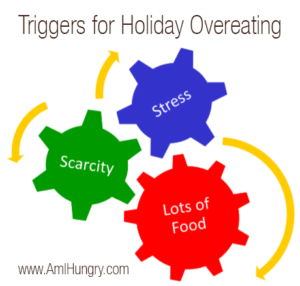The holidays are a time of celebration, reminiscing, and of course, stress – all potential triggers for holiday overeating. In our Mindful Eating Support Community and our Facebook page, I asked about your top three triggers for holiday overeating. I grouped your most common challenges into these patterns:

- The presence, abundance, and variety of food everywhere
- Special holiday foods, compounded by feelings of scarcity
- Nostalgia, memories, and associations (both positive and negative)
- Food “pushers” (your word, not mine; more on that below.)
- Stress, fatigue, self-imposed expectations, and perfectionism
- Stressful family dynamics
What makes these triggers for holiday overeating even more challenging is that they interact with one another, magnifying their effect. I imagine that it might look something like these gears (though the impact of each of your particular triggers may be different).
How to handle triggers for holiday overeating
In Eat What You Love, Love What You Eat for Binge Eating (chapter 4), we shared three helpful options for dealing with your triggers: reduce them, rethink them, and recreate them. Here’s a quick overview of these three strategies.
Reduce Them
One way to handle certain triggers is to reduce your exposure to that person, place, event, or other trigger. In this way, you prevent the thoughts from coming up in the first place. For example, if people bring a lot of holiday foods to the office, you could decide, I’ll wait until I’m hungry to go to the break room.
However, it is impossible—and undesirable—to permanently eliminate every conceivable trigger, especially during the holidays. If you tried, your life would become very small! That brings us to our next option.
Rethink Them
Fortunately, it is possible to reprogram your mind so you don’t have to live in fear of encountering a trigger. When you recognize one of your triggers and watch the automatic thoughts that follow, you’ll discover that you have many options. Replacing automatic thoughts with new, more effective thoughts disrupts the old pattern. (Read more about how mindfulness helps rewire your brain.)
For example, if you notice scarcity thoughts like, I love Grandma’s cookies! I’ll get my fill now since I won’t have them again until next year! Cultivate abundance thinking instead: These holiday cookies will be back before I know it! or I can make turkey and mashed potatoes anytime I want.
Recreate Them
In this strategy, you turn a trigger for overeating into a trigger for self-care. This creates an entirely new pattern for yourself. For example, if you notice yourself thinking, I’ll have a little bit more; it’s a special occasion! you could think, If this occasion is so special, why would I want to ruin it by eating until I feel uncomfortable?
Reprogram Your Holiday Triggers for Overeating
Now let’s apply these strategies to create examples for how you can reprogram your most common holiday eating challenges.
Presence, Abundance, Variety of Food
Food is often at the center of our holiday celebrations: family gatherings, parties, and plates of homemade holiday treats everywhere. Tobi posted that “Awesome goodies are available in abundance, so if I’m stressed or bored, it’s there!” Most of us are food-suggestible so just seeing or smelling holiday foods can trigger the urge to eat. This is even more of a problem if you tend to think in “all or nothing terms,” such as, if I eat any, I might as well keep eating.
Reduce: I’ll make 2 or 3 of my favorite holiday cookie recipes instead of 6 or 7 batches this year.
Rethink: When food is everywhere, there’s no urgency to eat every time I see it. I can be selective about when, what, and how much I eat.
Recreate: There are so many wonderful things to eat and do during the holidays. While food adds to the enjoyment of our celebrations, I will focus on connecting with people I care about and doing things that are meaningful.
Special Foods, Compounded by Scarcity
Linda posted that “being around family members who make traditional family dishes that I don’t eat any other time of year” is a trigger for her. She added, “I get a little crazy just thinking about it.” People also posted about holiday cookies, eggnog, fudge, and Christmas dinner.
There’s a reason advertisers use “available for a limited time only” to urge shoppers to take action! When you believe that the opportunity to eat certain special foods will go away soon, you may be more likely to overeat those foods. Likewise, if you only give yourself permission to eat enjoyable foods on special occasions, it perpetuates scarcity thinking—the belief that you won’t be able to have this food again, so you have to get as much as you can, while you can.
Reduce: I’ll put the cookies the neighbors dropped off into the freezer so I have something to serve on Christmas Eve.
Rethink: Even though I don’t typically eat these cookies at other times of the year, I could. I can freeze a few, or make them again in February or March if I really want them.
Recreate: I eat what I love—and do what I love—year around, so there are no feelings of deprivation or fear of missing out to drive overeating during the holidays.
Nostalgia, Memories
Eating is a wonderful way to reminisce, nurture, and bond. Traditions can bring us back to memories of a simpler, or even happier time in our lives. Linda shared that she feels “sadness for those who have passed on.” Susan posted, “There are so many foods loaded with memories that I eat only at the holidays and I feel like I have to have them, or the holiday wouldn’t be complete.” The emotional tie to traditional foods, compounded by their limited availability, can be a powerful but sometimes unconscious driver for overeating.
Reduce: Reducing nostalgia may not be needed, unless memories are creating overwhelming sadness or other uncomfortable emotions. In that case, limiting exposure to triggering foods, décor, or activities may be helpful.
Rethink: Eating latkes brings back such happy memories! However, eating too many of them makes me unhappy.
Recreate: I will invite my grandchildren over and teach them how to make latkes to pass down this tradition.
Food “pushers”
I’m not a big fan of the label “food pusher.” Most of the time, even when someone seems to be “pushing” food on you, their motive is not malicious. They likely want to give you kindness and love, and in return receive your appreciation and affirmation.
Reduce: Mom, I appreciate your generosity and the way you show your love with your great meals! However, it is important that I decide for myself when, what, and how much I am going to eat.
Rethink: I realize that I have been blaming my family for “feeding me” too much food. I’m an adult now and I choose to take responsibility for my decisions about eating.
Recreate: I offer tons of food to my family and guests—maybe even push it on them. I will broaden the ways I show my love and hospitality instead of making it all about the food.
Stress, Fatigue, Perfectionism
Not only is food everywhere during the holidays, but you may feel more stressed, lonely, exhausted, overwhelmed, or even happier—all common triggers for overeating. Many people shared that they put a lot of pressure on themselves, like Sheila, who posted that her triggers include the “stress of having too much to do and trying to make the holiday perfect.”
Reduce: I will be selective about the number of things I try to do during the holidays and focus on those that are most enjoyable and meaningful.
Rethink: It is not necessary, or possible, to create the picture-perfect holiday for everyone—and I’ll wear myself out trying. I will focus on a few holiday traditions and invite my family members to take over ones that are important to them.
Recreate: I will practice good self-care in order to create a buffer between me and the inevitable stress. I will carve out enough time to rest and sleep, include physical activity in my plans, and say “no” more often.
Stressful Family Dynamics
All the “togetherness” we might experience during the holidays can be a bit much at times. Kelly and Emilie mentioned the stress of “having other people in my house.” Wendy posted about the stress of family arguing. She also mentioned the “anxiety of not being good enough,” which adds to stressful family situations if you feel like you are being judged by others and not measuring up—and may stir up old memories and conflict.
Reduce: I don’t need to be with everyone all the time. I will carve out a little solitude to relax with some hot tea in front of the fire.
Rethink: I have trained people how to behave… if continue to wait on them, decline their offers to help, and don’t say what we want or need to happen, they will just show up and relax, never realizing there is a problem! I am going to let people know that I look forward to relaxing with them and that I need their help so I have time to enjoy their company.
Recreate: Being around my parents during the holidays stirs up a lot of old hurt. It is time that I scheduled an appointment with a counselor to work through some of these issues.
Updated from a previously published version.
Enjoyed this article? Here are three more to help you:
How to Rewire Your Brain to Change Your Habits
Not another “How to Cut 300 Calories from Your Thanksgiving Dinner” article
Handling Holiday Eating and Stress: A Recipe for Mindful Eating

